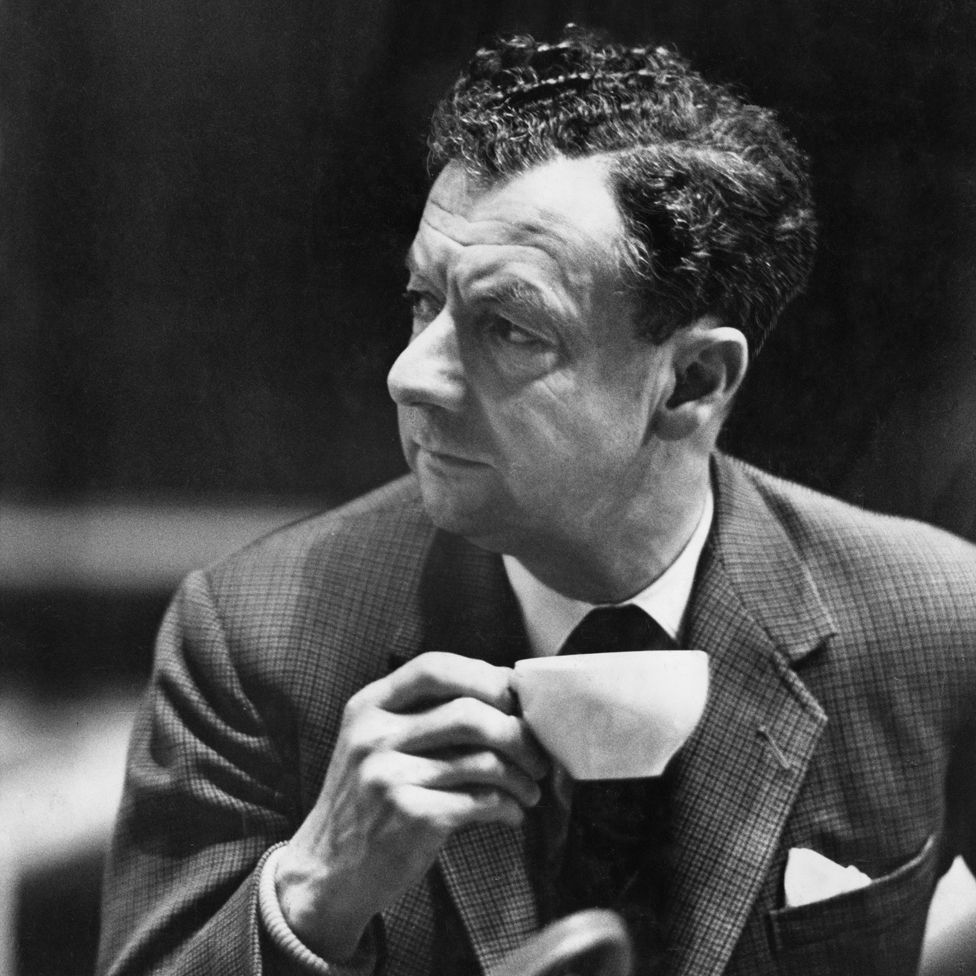Benjamin Britten's 'lost' Malaysian anthem
- Published

The great English composer Benjamin Britten once wrote Malaysia a national anthem - only for it to be rejected it in favour of a cabaret tune. Did the government make a horrible mistake, asks Alex Marshall, author of a new book on the history of anthems.
Malaysia's national anthem is the gently stirring Negaraku, or My Country. It talks about Malaysians living together "united and progressive" and their desire for the king to have a "successful reign". It is, in other words, like dozens of other anthems - a song popular within its own borders that is unlikely to grab attention overseas.
But things could have easily turned out completely differently. Back in the 1950s, Malaysia (which was then the Federation of Malaya) came very close to adopting an anthem by one of the most important composers of the 20th Century - a man whose name alone might have made the anthem as famous la Marseillaise or the Star-Spangled Banner.
In 1957, the country's government asked Benjamin Britten to write it an anthem. He accepted the challenge, composing the tune below. However, the government mysteriously rejected it and it instantly disappeared, never to be recorded until now. Did they make the wrong choice? I'll let you judge.
Benjamin Britten's anthem for Malaysia, played by Robin Stephenson
Britten - composer of the opera Peter Grimes and the exhilarating Young Person's Guide to the Orchestra - is the last person you would expect Malaysia to have approached. His music couldn't have sounded more British, for a start.
He also only ever stepped foot in Malaysia once, and then only for a few hours, while on a world tour in 1956. He was meant to go on an excursion to a rubber plantation but instead spent most of the "really hair-raising" trip fearing he was about to be shot by communist guerrillas.
"We had a taste of what it's like to live always armed and in fear of one's life," he wrote to a friend afterwards. The week before, the guerrillas had cut someone's head off, he noted.
At one point he got stuck in a thunder storm and spent the next hour "waiting every moment for the rattle of machine guns". He only stopped panicking when he realised "the bandits hate rain as much as we do". He couldn't have been more relieved when he got back to his hotel, across the border in Singapore.
But in June 1957 the Malaysian government was desperate for an anthem. It was to become independent from Britain in less than two months and it still didn't have a song - or, for that matter, a flag. It had trawled folk songs, but found nothing suitable. It had held a global competition, receiving more than 500 entries, but rejected them all. Britten was the last roll of the dice.
The government approached several other well-known composers - notably William Walton, known for his coronation marches - but none of them took up the offer.
Britten struggled for two days to write something suitable, sketching one tune after another, but dumped them all, writing to the violinist Yehudi Menuhin that it was "a frightful job". What he eventually produced was, by his own admission, "a curious & I'm afraid rather unsuccessful job".
The Malaysian government obviously wasn't impressed either as a few weeks later it returned the manuscript and asked if he could make it sound more Malaysian. They included several tapes of folk music in the hope he would incorporate one of the melodies. Britten obliged, even though he thought the tapes featured some of "the oddest noises" he had ever heard, as well as some appalling "mock-Western light music".
He submitted the final version weeks before the 31 August independence celebrations. But the government rejected it in favour of Negaraku.
The tune of Negaraku was then used as the anthem of Perak - one of Malaysia's states - though it was popular throughout the country, and could often be heard at parties and in cabarets (oddly, it was also a popular Hawaiian song).
The government gave no reason for rejecting Britten's composition, and it simply disappeared from memory. It has only been played publicly once - in 2007, at a London concert to celebrate 50 years of Malaysian independence. The score has never been published; I obtained the sheet music directly from the Britten-Pears Foundation.
"Britten accepted the commission for two reasons," says Mervyn Cooke of the University of Nottingham, a leading Britten scholar who has written about the composer's relationship with Asia. "He strongly believed in writing useful music and anthems certainly fall into that category. But, more mundanely, the total fee of 100 guineas was quite considerable for such a tiny piece."
Cooke guesses that Malaysia's rejection of the score had nothing to do with the anthem's quality, or slightly pensive sound. "The most likely reason is that on the momentous occasion of their independence from Britain, they felt it would be entirely inappropriate to have an anthem composed by an Englishman," he suggests.
Britten himself told his publisher that though he was "infuriated" he was "not surprised" by the decision. "I was too much in the dark over the whole matter to be able to please them," he wrote.
He praised the publisher for resisting the temptation to return the cheque. Then he added: "Don't you think we should ask for the return of the manuscript? After all, it might come in handy for some other Eastern nation."
Alex Marshall is the author of Republic or Death! Travels in Search of National Anthems. He discusses anthems written by other famous composers on his website.
- Published29 September 2015
- Published5 March 2015
- Published18 June 2013
- Published8 June 2013
- Published1 February 2013